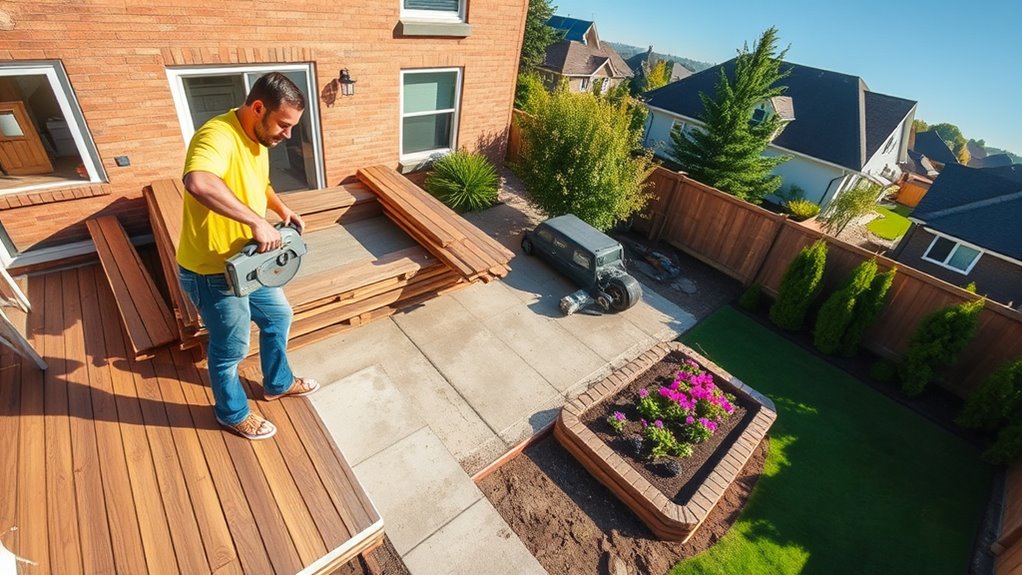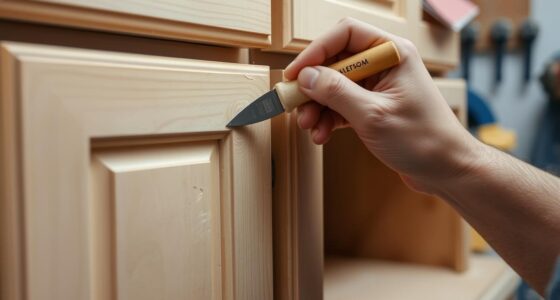Most home improvement projects require permits to make certain safety, legal compliance, and property protection. These include major renovations like adding rooms, roofing, electrical or plumbing upgrades, and even smaller projects such as fencing or decks. Checking with your local building department helps determine what’s needed for your specific project. Securing permits before starting can prevent costly fines, delays, or safety issues. Follow along to discover which projects you might need permits for and how to handle the process smoothly.
Key Takeaways
- Major renovations like adding rooms, roofing, or electrical and plumbing upgrades generally require permits.
- Smaller projects such as building decks or fences may also need permits depending on local regulations.
- Always check with your local building department to determine specific permit requirements for your project.
- Permits ensure compliance with zoning laws, safety standards, and building codes, preventing legal issues.
- Securing permits before starting work helps avoid delays, fines, and potential problems during property sale or inspection.

Ever wondered why permits are vital before starting a project? The answer lies in the significance of adhering to building codes and zoning laws that protect both your property and the community. Building codes set the standards for safety, structural integrity, and energy efficiency, ensuring that your project meets minimum requirements. Zoning laws regulate land use, dictating where you can build, what you can build, and how your property can be used. Ignoring these regulations can lead to fines, legal issues, or even having to undo work you’ve already completed. That’s why obtaining the proper permits isn’t just a bureaucratic step; it’s an indispensable part of responsible home improvement.
Permits ensure safety, compliance, and protect your property through adherence to building codes and zoning laws.
When you plan a project, you need to determine whether a permit is required. Generally, major renovations like adding a new room, installing a new roof, or making significant electrical or plumbing upgrades typically require permits. Even smaller projects, such as deck building or fence installation, can sometimes fall under permit requirements depending on local laws. The key is to check with your city or county building department to understand the specific rules. This step helps guarantee your project is compliant with existing building codes, which cover everything from structural safety to fire prevention. It also guarantees that your work aligns with zoning laws, preventing issues like building too close to property lines or violating height restrictions. Additionally, some projects may involve building code compliance requirements that ensure the safety and durability of your additions.
Getting permits also means your work will be inspected at various stages. These inspections verify that your project complies with all safety standards and legal requirements. Without permits, you risk having your project deemed illegal, which could lead to costly fines or the need to tear down work that isn’t up to code. Additionally, permit approval process can sometimes be lengthy, so planning ahead can help avoid delays. Plus, if you ever decide to sell your home, unpermitted work can create hurdles during inspections or appraisals, potentially decreasing your property’s value. That’s why securing permits beforehand saves you time, money, and headaches down the line. Additionally, understanding home decor elements involved in your project can ensure that your improvements not only meet legal standards but also enhance your space’s aesthetic appeal.
Frequently Asked Questions
Are Permits Required for Small Interior Remodeling Projects?
You might wonder if permits are needed for small interior remodeling projects. Generally, permit types vary depending on the scope, like electrical, plumbing, or structural changes. Even small projects often require permits to meet inspection requirements and guarantee safety standards. Check with your local building department to confirm what permits are necessary, as failure to obtain them can lead to fines or issues during future home sales.
How Long Does the Permit Approval Process Typically Take?
When you ask about permit approval times, it usually depends on your local building codes and the project’s complexity. Most permits take from a few days up to several weeks, especially if plans need review or adjustments. Keep in mind, some minor projects might qualify for permit exemptions, speeding up the process. To avoid delays, make sure your application is complete and complies with all regulations.
Can I Start My Project Before Obtaining a Permit?
You shouldn’t start your project before obtaining a permit, even if there are permit exemptions. Starting early can delay your renovation timelines and cause legal issues. Permits guarantee safety and code compliance, so check with local authorities first. While some minor projects are exempt, it’s best to verify to avoid penalties. Always wait for approval to keep your project on track and avoid costly rework or fines.
What Are the Consequences of Working Without a Permit?
If you work without a permit, you risk permit violations that can lead to serious legal penalties. Authorities may order you to stop work, remove completed improvements, or even face fines. Not having permits can also complicate future resale or insurance claims on your home. To avoid these issues, always check local regulations and secure the necessary permits before starting your project, ensuring you’re compliant and protected.
Are Permits Necessary for Aesthetic Improvements Like Painting or Flooring?
Thinking about aesthetic upgrades like painting or flooring is like adding jewelry to an outfit—it’s about enhancing appearance. Generally, permits aren’t needed for these projects, as they fall under permit exemptions. However, if your improvements involve structural changes or electrical work, you’ll need to check local regulations. Always verify with your city or county to make certain your aesthetic upgrades remain compliant and avoid potential issues down the line.
Conclusion
So, next time you’re tempted to skip that permit and plunge into your DIY project, remember this: those tiny, hidden violations can turn your perfect home into a construction zone of regret. Imagine your dream renovation turning into a nightmare, all because you ignored the simple step of getting a permit. It’s ironic how a tiny piece of paper can save you from a mountain of trouble—so don’t overlook the permit; it’s your best safeguard against home improvement chaos.









